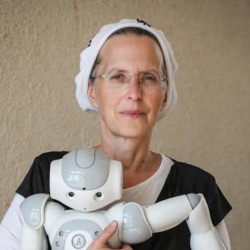Keynotes
Talk: Predicting Human Decision-Making: From Prediction to Action
Talk Abstract:
Automated agents that interact proficiently with people can be useful in supporting, training or replacing people in complex tasks. The inclusion of people presents novel problems for the design of automated agents’ strategies. People do not necessarily adhere to the optimal, monolithic strategies that can be derived analytically. Their behavior is affected by a multitude of social and psychological factors. In this talk I will show how combining machine learning techniques for human modeling, human behavioral models, formal decision-making and game theory approaches enables agents to interact well with people. Applications include intelligent agents that help drivers reduce energy consumption, agents that support rehabilitation, employer-employee negotiation and agents that support a human operator in managing a team of low-cost mobile robots in search and rescue tasks.
Speaker Biography
Sarit Kraus (Ph.D. Computer Science, Hebrew University, 1989) is a Professor and is the Department Chair of Computer Science at Bar-Ilan University. Her research is focused on intelligent agents and multi-agent systems (including people and robots). In particular, she studies the development of intelligent agents that can interact proficiently with people and with robots. She studies both cooperative and conflicting scenarios. She considers modeling human behavior and predicting their decisions necessary for facing these challenges as well as the development of formal models for the agent’s decision making. She has also contributed to the research on agent optimization, homeland security, adversarial patrolling, social networks and nonmonotonic reasoning. For her work she received many prestigious awards. She was awarded the IJCAI Computers and Thought Award, the ACM SIGART Agents Research award, the EMET prize and was twice the winner of the IFAAMAS influential paper award. She is an ACM, AAAI and ECCAI fellow and a recipient of the advanced ERC grant. She also received a special commendation from the city of Los Angeles, together with Prof. Tambe, Prof. Ordonez and their USC students, for the creation of the ARMOR security scheduling system. She has published over 350 papers in leading journals and major conferences. She is the author of the book “Strategic Negotiation in Multiagent Environments” (2001) and a co-author of the books “Heterogeneous Active Agents” (2000), “Principles of Automated Negotiation” (2014) and ” Predicting Human Decision-Making: From Prediction to Action” (2018). Kraus is a senior associate editor of the Annals of Mathematics and Artificial Intelligence Journal and an associate editor of the Journal of Autonomous Agents and Multi-Agent Systems and of JAIR. She is a member of the board of directors of the International Foundation for Multi-agent Systems (IFAAMAS).
Talk: Human-Artificial Intelligence Partnerships
Talk Abstract:
In our increasingly connected world, computation is everywhere and we are generating ever more data about everything. These trends will profoundly change the ways in which we work with computers. Specifically, we need the machines to be smarter and more helpful. Central to this vision is the means by which we can forge effective partnerships with such artificial intelligence (AI) systems. Until now, humans have generally been the masters and technology the slave. This needs to change. Today’s AI systems can act on high-level human commands and achieve complex goals in a flexible manner. But, while such systems are good at solving narrowly defined tasks, they don’t know how to collaborate with humans or how to operate as part of a problem-solving team. This talk will explore how humans and AI systems can work together. In such partnerships, the humans and the AI systems complement each other’s strengths and weaknesses, leading to a rise in the humans, as well as in the machines. Drawing on multi-disciplinary work in the areas of AI, autonomous systems, machine learning, crowd sourcing and ubiquitous computing, this talk explores the scientific underpinning of such systems, the applications they have been applied to, and the societal implications of their widespread adoption.
Speaker Biography
Nick Jennings is Vice-Provost (Research and Enterprise) and Professor of Artificial Intelligence at Imperial College London. Before joining Imperial, he was the Regius Professor of Computer Science at the University of Southampton (a post created by the monarch to recognise research excellence) and the UK Government’s Chief Scientific Advisor for National Security. Nick is an internationally-recognized authority in the areas of artificial intelligence, autonomous systems, cybersecurity and agent-based computing. His research covers both the science and the engineering of intelligent systems. In undertaking this research, he has attracted grant income of over £25M, published more than 600 articles and graduated 45 PhD students. With over 70,000 citations and an h-index of 111, he is recognised as highly cited by ISI Web of Science in both the Engineering and the Computer Science categories. He has received a number of international awards for his research including the Computers and Thought Award and the ACM Autonomous Agents Research Award. He is a Fellow of the Royal Academy of Engineering, the Institute of Electrical and Electronic Engineers, the British Computer Society, the Institution of Engineering and Technology, the Association for the Advancement of Artificial Intelligence (AAAI) and the European Artificial Intelligence Association (EurAI) and a member of Academia Europaea. He was made a Companion of the Order of the Bath (CB) in the Queen’s New Year Honours List in 2016 for his services to computer science and national security science.

